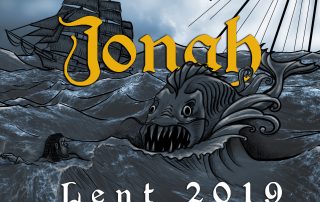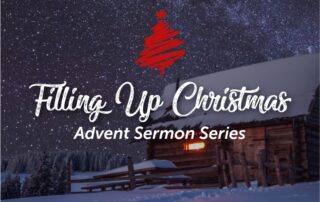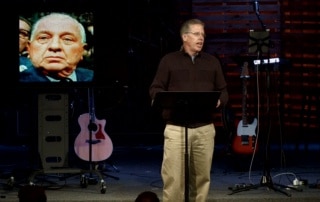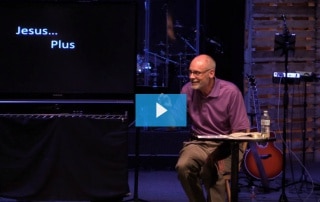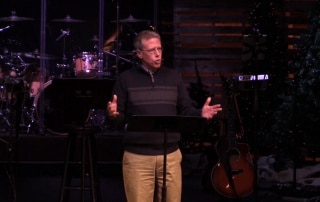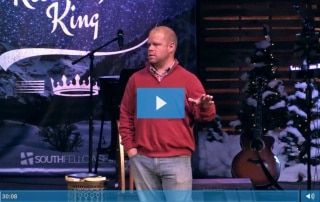Jonah | Prophetic Pagans | Jonah 1:4-17 | Week 2
Fill out the form below to have a PDF with more information sent to you
SMALL GROUP QUESTIONS
If you have questions regarding this sermon you can request the PDF
JONAH: Life on the Run Jonah 1:1-3
Over the next six weeks, we’re going to have the chance to journey with Jonah, to allow Jonah to be our guide through the Lenten season. Our guide to the cross. Our guide to the resurrection. Metaphorically speaking, we’re going to take Jonah’s hand and we’re going to go for a little bit of a walk. My guess is, even if you’re not a follower of Jesus and you’re here today, even if you don’t know much about the Bible, you’ve heard about Jonah. Turns out the story about a person getting eaten by a fish and living for three days in its belly is ubiquitous. News about that travels. My guess is you have an opinion about the book of Jonah.
I can remember being a college pastor and walking onto a college campus in southern California, and having someone come up to me. We started a conversation about life, and faith, and Jesus, and it was almost like they hit pause and said, “You don’t really believe in the whole Jonah story, do you?” How do you answer somebody who has no interest in faith, has no background in faith or maybe stepped away from faith? What do you say? Here’s what I said, “Well, I believe that Jesus of Nazareth died, and was buried in the earth for three days, and walked out of the grave, so I guess believing that somebody survived in the belly of a fish isn’t any harder than that.” My goal was let me get to Jesus as quick as I can.
Over the last few months, I’ve been studying this book of Jonah trying to prepare for this series we’re doing. My guess is you might have a few questions, like, Ryan, how should we read this book? What should we do with this ancient text? That’s a great question. There’s really three things people have done with Jonah over the years. The first is that people have read Jonah as history. That’s actually the most common way to read Jonah throughout the history of the church. People will argue that in Matthew 12, Jesus seemed to view Jonah as history. To that I say I think you can read the text that way, although I don’t think you need to. I don’t think it’s the fail-safe, although if Jesus believed that Jonah was a historical event, that what we read about is history, I’m with Jesus! It’s what the early church fathers thought. Almost every single one of them would have affirmed that Jonah should be read as history, as narrative—St. Jerome, St. Cyril, Theophilus.
There’s another way to read the book of Jonah also. It’s to read it as parable. Underneath that big banner of reading it as parable, there’s really two streams. One that I think is good and you can read it that way if you want to, and the other, I would say, I don’t think you should read it that way. Let me start with the ‘I don’t think you should read it that way.’ Under parable, some people read Jonah as parable because they go I just can’t believe that somebody would get swallowed by a fish, live for three days, get spit onto dry land and be okay. That’s what most people think, right? Here’s what happens, if we go I can’t believe that happened, therefore I have to read it a different way, what else do we have to do that with in the Scriptures? Do we do that with the Red Sea? It couldn’t have split. Do we do that with Jesus walking out of the grave? Just metaphor, couldn’t happen. Here’s the truth of the matter, there’s a number of things that have happened that are hard for you to believe have happened. I think that’s a pretty weak lens for you to live your life through—if I didn’t see it then I don’t believe it could happen. Let me give you an example. My wife and I watched a movie called “Free Solo” this weekend. It’s about this young man who free-climbs the face of El Capitan. Three thousand vertical feet of glass-like granite that this man climbs up……without a rope! If you were to stand in Yosemite Valley and look at El Capitan and I were to tell you, “Hey, somebody climbed that without any ropes,” my guess is, if you didn’t know the story, you’d go, impossible! Couldn’t have happened. Until you found out it happened! There’s a documentary and I’d encourage you to watch it, it’s fascinating! I don’t think it’s any way to live and I don’t think it’s any way to view Jonah—if I can’t imagine it happening, I can’t believe it, therefore, it didn’t happen.
There’s another stream, there are some people who read Jonah as parable, not because they don’t think it could happen, but because that’s what they think the literature of Jonah actually suggests, as far as the way you should read it. You read it and it’s not just that a man gets eaten by a fish, it’s that cows repent in sackcloth and ashes. And there’s all sorts of hyperbole all over the book, which there is. Whether you like it or not, there’s a lot of hyperbole. A tree sprouts up and grows overnight and then dies. Some people read it and go, I’m not sure if it’s suppose to be taken literally. I think it’s more of a parable. I think it’s more of a story. Before you go well, if it’s a story than it doesn’t have anything to say to us really. If it didn’t really happen…..if really happening is the thing that makes it important, to that I just say to you, did we say that at all when we talked about the parable of the Prodigal Son? No, the important part of the prodigal isn’t that it happened, it’s that it happens. People who read Jonah that way, that’s what they would say about the book of Jonah. I think you could read it either way, to be quite honest with you.
Here’s what I think is true about Jonah—I think you can MISS the point of Jonah, reading it as parable or history. I think you can GET the point of Jonah by reading it as parable or history. Because it’s not primarily parable OR history. What section of books is Jonah in? The minor prophets. Before we read Jonah as history and before we read Jonah as parable, we need to read Jonah as prophetic. We need to read Jonah asking the question, God, our lives are open to you, what do you want to say to us, through your prophet Jonah, through his story, through his actions? God, what do you want to say to us? Before we talk about if it’s history, if it’s parable…..God, it’s prophetic. We believe that. What do you want to say to us through your prophet Jonah? Yeah, it’s important because it happens. Before we try to dissect Jonah and pin it down, maybe we should just pause for a moment, and posture our hearts to be prepared to be pinned down by it.
It’s less about what genre it falls in. It’s prophetic. There’s a message to the book of Jonah, and if I could summarize the message in one line, it would be this: A resentful prophet encounters a relentless God. That’s what Jonah is all about. A resentful prophet who encounters a relentless God. It’s about a prophet who says “no,” and a God who says I won’t let go. How many of you are grateful that this book is in the Scriptures, if this is what it’s about? I am! Because my heart is prone to wander, prone to leave the God I love. So, Jesus, today, take and seal it, seal it for thy courts above. That’s in me! My guess is that that’s in you, to some degree, as well. This is great news! Jonah is great news for people that often tell God “no.”
At the onset of this series, let me give you a few themes from this book, as far as the way we should read it. I don’t want you to miss, as we read through this book over the next few weeks, that it is absolutely beautiful, genius, Hebrew literature. It’s genius. The way that the book is mapped out. The way that the first half mirrors the second half. The way that the narrator withholds this punch line; you have no idea why Jonah is running from God until chapter 4. The narrator is inviting you in deeper, deeper, deeper….until BOOM! he sucker punches you in chapter 4 and you find out why. It’s brilliant!
But it’s also funny. There are portions of Jonah that the original audience would have chuckled at. Now, a language later, a few thousand years, a different culture, some of it’s lost on us, and I’m going to do my best over the next few weeks to just tell you where you should laugh. Some would say Jonah is funny, but it’s also this “compassionate irony,” as one author calls it. Another suggests that it’s sort of satire. We’re suppose to chuckle a little bit.
Maybe more than any of those, Jonah shows us something about what it means to be human. That we are sometimes frail and often fickle. That we are often wrong when it feels like we’re 100% right. That we often hear God right, but think of God wrong. That we want mercy and grace for ourselves, but judgment and wrath for others. We are Jonah. So, before we throw stones at Jonah for being one of the worst prophets ever, which he might have been, we’re going to try to see Jonah in the mirror, and ask Jesus what can we learn from this ancient prophet, from this ancient book, that feels so weighty and so modern?
Will you turn to Jonah 1:1-3? Jonah is in the minor prophets that are not minor because they’re less important, they’re minor because they’re shorter. Let me give you a little bit of background. Jonah is different than the other minor prophetic books. It suggests maybe we should read it a little bit differently. Jonah has no reference to a king. So no reference to “this is the time that I’m writing” and you can place me in a timeline and here’s when I wrote. No reference to a king. And no reference to an oracle that comes from God. Certainly there’s a word from God, but there’s no oracle from God. It’s very different from the other prophetic books that are in our Scriptures.
Starting in verse 1 of chapter 1, let’s dive into Jonah, we’re going to have a whale of a time! Don’t encourage me! The word of the Lord came to Jonah son of Amittai: {Which, by the way, means truth.} “Go to the great city of Nineveh and preach against it, because its wickedness has come up before me.” But Jonah ran away from the Lord and headed for Tarshish. He went down to Joppa, where he found a ship bound for that port. After paying the fare, he went aboard and sailed for Tarshish to flee from the Lord. Three short verses, but they frame the entire book for us. Let me tell you about the plan, the people, and the prophet.
Here’s the plan: Jonah, I want you to go and I want you to preach against Nineveh. I want you to go and deliver a message. It’s wickedness has come up before me. If you’re a student of the Scriptures, that’s sort of an echo from a passage we’ve read before — It’s wickedness has come up before me. Do you remember where? Genesis 6:5. It’s Noah. The wickedness of the people has risen up to me, therefore I’m going to destroy, I’m going to wipe them out. I’m bad at keeping a secret, so I’m going to tell you why Jonah’s running from God. You’re not going to find out until chapter 4, but we need to talk about it now because it’s important. Jonah doesn’t actually think God’s going to do that . He has this sneaking suspicion, Jonah does, that God is slow to anger, that he’s compassionate, that he’s abounding in love, and that he’s forgiving. Here’s what Jonah’s worried about. Jonah is worried that God is like Jesus. Jonah is right! So we see this “its wickedness has come up before me.” In Genesis, it’s destroy them. In Jonah, it’s preach against them. In Jesus, it’s forgive them. Jonah is not sure he likes the plan.
The people he’s going to—these Ninevites. Nineveh is the capital of Assyria, at the time. Ninevites were known for being a brutal people. They did things to the people they captured. They tortured them. They decapitated them. They dismembered people. And they were proud of it all. They flaunted it all. In fact, if you were defeated by the Ninevites, they would put it in your face by….if you were a man and you were at war, they would cut off your head, put it on a pole, give it to your kids and have them parade your head through their victory parade. They would lop off peoples legs, both of them, and their left arm; they would leave the right arm and right hand in tack so when the victory parade happened, you could shake the hand of the victors before you bled out and died. I can see where Jonah’s coming from. Nineveh would have been called a “Terrorist State.”
Is Jonah racist? He might be. But maybe he just thinks he knows right and wrong, and he certainly would have identified the Ninevites as wrong. As evil. Maybe he just thinks, “God, you know what’s wrong and that’s wrong, and you fall on the side of right, therefore, God, you are against the Ninevites.” He probably assumes that his hatred for the Ninevites is not only justified by God, but shared by God. When he finds out he’s wrong, his house of cards starts to crumble rapidly. Jonah may not be a racist, but he certainly is nationalistic. Which means he might be a lot easier for us to relate to than some dude who got swallowed by a fish. He loves him some Israel, and he believes God is for Israel. Is God for Israel? Yes. Is God for Nineveh? Yes. God’s for humanity. He so desperately wants to see Israel flourish that he has this line of thinking—God, I don’t like those people. They’re not part of our tribe, therefore, I’m pretty sure you don’t like those people either! Which is a dangerous line of thinking, because whoever we fill in the blank with—I don’t like that group and God, I’m pretty sure you don’t like them either—you do realize you are somebody’s fill-in-the-blank. God, I’m sure you don’t like them because of whatever. Your name, our name, a follower of Jesus…..that goes in that fill-in-the-blank. Man, it’s so easy to feel justified in hatred because somebody’s not part of our group. And to think, God, you’re only for this one little sliver. That’s how cycle of violence and retributive justice continue over and over and over again, and maybe the prophetic word of Jonah is that’s tired. There’s a better way, as we lead to the cross. There’s a better way! This prophet Jonah shows us that way.
If you think Jonah was just parable, I’d encourage you to wrestle a little bit with the reality that Jonah was a prophet. He served in Israel. Let me show you the other passage that references this same Jonah we’re talking about. Speaking of Jeroboam. (2 Kings 14:25) He was the one who restored the boundaries of Israel {Jeroboam II was the king of Israel under Jonah’s prophetic reign.} from Lebo Hamath to the Dead Sea, in accordance with the word of the Lord, the God of Israel, spoken through his servant Jonah son of Amittai, the prophet from Gath Hepher. Here’s the thing—There were other prophets who were prophesying during Jonah’s time and during the reign of Jeroboam II. Amos. Hosea. Amos and Hosea were looking at the way that Jeroboam operated. The way that he used militaristic power to expand the borders of their empire. The way that he destroyed people in their wake. The way that he would go to any extent to make Israel great. Jonah was the lone voice that said, “I support him.” Hosea and Amos were going, “Jeroboam, you’re off. God is not for this.” You read through their books, they are very, very critical of Jeroboam’s reign. Jonah, not so much. Jonah wanted to see Israel flourish….at any cost!
So it starts to make sense, doesn’t it? The word of the Lord comes to Jonah son of Amittai, go preach against Nineveh, and he has a sneaking suspicion in the back of his head, like, God, you might just forgive them, and that can’t happen. So what does he do? He runs. He finds himself in Joppa. Instead of going to Nineveh, which is almost directly east, he goes to Tarshish, which is almost directly west. And we’re supposed to go hahaha. But more than that, we’re suppose to think about the reality that runningfrom God is often easier than trustingGod.
Even as followers of the way of Jesus, friends, let’s come to terms this morning, let’s loosen the halo just a little bit, to say that there’s a runner inside of each one of us. There are ways that when we hear the way of Jesus, we’d rather run the other way. We’d rather run the other way than forgive our enemies and pray for those that persecute us, and let go of our anger and our lust and our hatred. Some days we would just rather run the other way, wouldn’t we? I would say that there’s a little bit of Forrest Gump inside each one of us. Three years, two months, fourteen days, sixteen hours, Forrest Gump spent running across America back and forth, back and forth, back and forth. I went back and watched this scene (research!). It starts out by him saying, “I don’t know exactly why I was running, I just started running. I felt like running.” At the end of his run, he said this, “I was running because sometimes you have to put the past behind you before you can move into the future.” I thought, oh, I know some runners like that. The American cartoonist, James Thurber, said it like this: “All human beings should try to learn, before they die, what they are running from, and to, and why.”
Here’s part of what’s in our souls, friends, is that when we run, we get to live under the perception of control. And it’s just that, it’s a perception. But we get to hold onto this sort of fantasy that I’m actually in control of the way everything goes, so I’m going to run the other way. But when I step into the way of Jesus, and I listen to him, I have to trust and I have to surrender, and there are moments when that grates against everything in me. Yes? It grated against Jonah.
Maybe our running looks a little bit like this: Instead of failing, we won’t even try. That’s a form of running. Instead of facing our hurt, maybe we just shut our heart down. That’s a form of running. Instead of getting wounded, I’ll get offended, because that’s an easier emotion to deal with. Or maybe I’ll get angry. Instead of embracing calling, maybe I’ll just settle for comfort. Instead of taking risks, I’ll just embrace routine. Instead of engaging with the people around me with a sort of relational depth where we actually share life, I’m just going to entertain myself. And amuse myself to death, as Neil Postman writes. We. Are. Runners. We’re Jonah.
It’s interesting, if you were to read through the book of Jonah—and I’d encourage you to do that at some point—here’s what you’ll find. Jonah runs in two different and distinct ways. The first two chapters, Jonah is running in outright disobedience. He’s like God, the heck with you, Tarshish is calling my name. But in chapters 3 and 4, Jonah is also on the run. Don’t mistake his going to Nineveh to say he’s not running from God anymore. Jonah is on the run in the second half of the book through religion. That’s how he’s running then. The first half of the book is rebellion. The second half of the book, he runs through religion. God, I’m going to go through the motions. God, I’m going to do it because you told me to do it, but my heart’s not in it at all. For us as followers of Jesus, we come to church—maybe you come every single week—it might be one of the ways you run from God. To just feel a little bit better. To go, yeah, that’s in me, but never do anything about it. We can run through rebellion or we can run through religion, but either way, we’re trying to avoid the One who is chasing us down. Eugene Peterson says—and I think he’s right—that Jonah is far more attractive in his outright disobedience than he is in his begrudging obedience to God. He’s way more attractive in chapters one and two than he is in three and four.
Here’s the truth of the matter, friends,—and lean in for a moment—running from God and running from pain is ALWAYS running from reality. I don’t know if you ever realized how unsuccessful you are in trying to avoid reality. But it just finds us at every turn, doesn’t it? You sneak around a corner and you’re like, “Aahhh! Reality! You’re there!” So Jonah’s this invitation to recognize the way that God works and the way that the human soul often works. Let me point out a few things, this morning, out of Jonah 1:3, that we find out from Jonah’s life. But Jonah ran away from the Lord and headed for Tarshish. He went down to Joppa, where he found a ship bound for that port.
I spent some time imagining that scene this week. Jonah’s heading from his home and going “down.” You’re going to find out that that theme “down” is going to continue all throughout the first chapter of this book. Jonah goes down to Joppa. Jonah is going to go down into the ship. He’s going to go down into the base of the ship. He’s going to go down into the ocean. It’s like the narrator wants you to know ‘it’s about to go DOWN!’
Jonah walks down and gets to Joppa and the picture is like that there’s just a ship ready to roll. He doesn’t have to wait, he makes a decision, and it’s there. It’s like it was waiting for him. It’s like Genesis 4:7 says: …sin is crouching at your door…. It’s right there. It desires to have you, but you must rule over it. Here’s what Jonah teaches us — There’s always a ship headed for Tarshish. Disobedience will always be an option, therefore, obedience must be a conscience choice. Amen.
It’s interesting because Tarshish and Nineveh are opposites in every way. We’ve already established that geographically they’re opposites, but Nineveh is this terrorist state that is filled with blood that is absolutely brutal, and dominated by people who use their creativity to figure out ways to kill people in more painful ways. Tarshish, however, is Hawaii. Tarshish is a paradise. Tarshish is where the rich people went to get away from it all, to have a luau and sip on a mai tai. That’s Tarshish. Jonah, as much as he maybe gets wrong, he gets this right. Where does Jonah try to flee TO in order to get away from the presence of God? If you were to lay it out and you were to say, “Hey, where is God more present?” In a tropical paradise where you can put your beach towel out and soak up the sun? 82 degrees every day. Crashing surf. Great service. OR….in a terrorist state where people are losing their lives and people are coming up with creative ways to kill people? Where’s God more present? Jonah says I’m running away from the presence of God….He’s in Nineveh, I’m going to Tarshish. Jonah knows what we often forget. We often forget that we meet God in the pain. We often forget that we meet God in the struggle, in those dark corners. In those things that we’d rather ignore, and the places that we’d more like to forget. Those are often the places we meet God. Yet we use pleasure, we use Tarshish—we have a number of Tarshii in our life—in order to escape Nineveh. But Nineveh’s often the very place where we meet God.
Two times, in this very first section, Jonah says I am going to get away from the Lord, I’m fleeing from the presence of the Lord. Question: Is that actually possible? No! What he’s finding out is what the psalmist wrote: Where can I go from your Spirit? Where can I flee from your presence? If I go up to the heavens, you are there; if I make my bed in the depths, you are there. If I rise on the wings of the dawn, if I settle on the far side of the sea, even there your hand will guide me, your right hand will hold me fast. (Psalm 139:7-10) Jonah’s version of this is, “I can’t get away from you! Selah!” The truth of the matter is, friends, is that temptation, and sin, and running don’t actually distance us from God, they simply prevent us from being able to enjoy his presence. So Jonah shows us what human freedom looks like at work. You do know that God will never force you to make a decision you don’t want to make, right? As C.S. Lewis says: “God created things which have free will. That means creatures which can go either wrong or right. Some people think they can imagine a creature which was free but had no possibility of going wrong; I cannot. If a thing is free to be good it is also free to be bad. And free will is what has made evil possible. Why, then, did God give them free will? Because free will, though it makes evil possible, is also the only thing that makes possible any love or goodness or joy worth having.” There’s always a ship headed to Tarshish, and you can choose it. I hope you don’t, but God won’t prevent you from doing so.
Second—But Jonah ran away from the Lord…. I’m guessing Jonah has a decent home. He supported the king, that’s how to get rich. I’m guessing Jonah had some good friends. So, why not just say no? Go to Nineveh! No! I’m staying here. But that’s not what Jonah does. Jonah says no, I won’t go to Nineveh, I’m going to Tarshish. Jonah is pointing out a truth to you and I that we would do well to allow to sink into our souls this morning. He’s showing us that there’s no such thing as neutrality. When you hear the call of God, you can’t just stay where you’re are. It’s either a yes or a no. It’s either a Nineveh or a Tarshish. But there is no in between. There’s no such thing as neutrality when it comes to God’s call. We often live under the guise of neutrality. Even in a marriage—well, it’s just cold, it’s not getting any worse or any better. It’s changing. It’s going one direction in a dead-end job…..well, I’m just putting in my time. You’re life is moving. It’s always moving. There’s no such thing as neutrality. Maybe today you just pause and ask Jesus, “What’s one thing I’m under the false assumption that is in neutral in my life?”
Finally it says: After paying the fare, he went aboard and sailed for Tarshish to flee from the Lord. There’s this nuance in the Hebrew that almost every scholar points out. What could be being said is that Jonah paid the fare for the entire ship. As if to say, what’s it going to take? Get me there as quick as we can. I don’t know if that’s right; there’s a number of other sailors, as we’ll see, that are on the ship. There’s some cargo that they’re taking, so we know that somebody else has a vested interested in this ship making it to Tarshish. We’re not exactly sure, but here’s what we do know: There is always a cost to running.
One of the costs is it’s exhausting. If we’re on the run, either from God or from pain or from our history, you name it, it is exhausting. You just watch the movie The Fugitiveand by the end of it you feel like you’ve had an entire workout, don’t you? Harrison Ford, just turn yourself in because I don’t think I can handle this. That’s the same thing that happens to the human soul while we’re on the run and we refuse to acknowledge reality in our life. It is exhausting! We’re running against the wind, as the old song says.
But it’s also unproductive. Jonah pays all this money. He spends all this time. He goes through all these efforts, and where does he end up? Right where he left. It’s treadmill living. We’ve got to put in three miles today. Eight-and-a-half minute miles. And when I got off that treadmill I was exactly where I was standing beforehand. That’s what addiction does, it’s running. Eventually you end up right where you left. It’s what happens when we pacify our pain, instead of actually confronting it. Will you look up at me for just a moment? You need to know that your running has cost you something. It always does. It might have cost you a level of intimacy in a marriage or in a friendship. It might have cost you time or energy or resources. But please hear me, whatever you are running from today, you will eventually have to deal with. So maybe we let Jonah read us. If I’m going to have to deal with it someday, God, then maybe today’s the day. Because the truth is running is a great way to escape, but it’s no way to live!
What if today, instead of running from God, instead of running FROM reality, we just started to run towards Him instead of away from Him. What might that look like? What might that journey, that downward journey this Lenten season, as we walk towards the cross and the resurrection, what might that journey look like this year? Here’s what it might look like as we use Jonah’s life to read ours. What if we started to pursue awareness? What if we started to take that question seriously? All human beings should try to learn, before they die, what they are running from, and to, and why. What if we started to say…..what if we said this week….you just write it in a journal somewhere and you take and picture of it and you process it with some time with God…..I run from _________, to ____________, because ____________. Maybe we use adventure to run or addiction to run. Maybe we use religiosity to run or we use rebellion to run. Maybe we choose pleasure to run, or we choose pain to run. Maybe we choose pride. Maybe we choose pornography. There’s a lot of different ways that we run. So it may sound something like this: I run from pain, to drugs or alcohol, because I don’t want to deal with reality. I run from intimacy, to entertainment, because I fear being known. I run from my calling, to security, because I’m afraid of failing. Hypothetically, something like that.
I printed out a handout for you, it’s the Prayer of Examen. It’s an ancient prayer guiding us to this place where we let God read us a little bit. I’ve had this realization, maybe a year ago, that as evangelicals we’re typically really good at teaching people how to read the Bible and not as good at teaching people how to let the Bible read them. We’re good at learning about God, but we’re not the best at learning from God, just sort of opening our hands to say God, what do you want to say? This is an ancient prayer practice that helps you position yourself to hear from God. Maybe this Lenten season you say each night before I go to bed, I’m going to embrace this prayer practice. If it’s helpful, use it, if not, use it as a coaster, I don’t care.
Second, choose repentance. Once God brings up some things we’re running from, sometimes our natural tendency is to say I couldn’t let that go, it’s such a part of me. Would you allow your imagine to run a little bit more free and say God, give me a vision for what this looks like, to live in a different way, and then God, I’m going to choose that way. I’m going to choose You! I’m going to choose your way, your heart, your path, the path of life. Repentance, it’s a beautiful word. It means there’s a platform to be honest and there’s a pathway home. Choose repentance.
Seek healing. This is why we have Celebrate Recovery that meets here Tuesday nights at 6:30. It’s why we have the support groups we have—-Grief Share, Divorce Care, a pornography group that meets. It’s why we do those things, you guys, because when we come to Jesus, we are made new, but we move a lot of old furniture into a new house. As a church, we are passionate about helping you walk in the way of Jesus with the heart of Jesus, and oftentimes that means healing. Did you know everywhere you read, in the New Testament, the word ‘salvation,’ you could translate the word ‘healing?’ Jesus is for your healing.
Awareness. Repentance. Healing. Finally, we say back to Jesus, “Where you are calling I will follow.” Don’t miss that Jonah’s running from God’s call on his life. We might be running from God’s call on ours, to live in his way with his heart.
Over the next few weeks, we’re going to journey with Jonah. But remember, as you start to see just how bad of a prophet he is, let’s not throw stones at him. I think he has something to teach us. To teach us about ourselves, to teach us about God. Things to teach us about what it means to be human. Let’s not throw stones at Jonah. Let’s try to see him in the mirror. Friends, may we become the kinds of people who, instead of running away from God, we run to him. Let’s pray.
Before you go running out of here, maybe ask the Spirit, “What’s one thing, Spirit, that you want to drive home? One thing you want me to walk away with?” Have I been choosing Tarshish? Have I been running from my pain? Have I been going to pleasure instead of just trying to sit in reality, as painful as it is? Jesus, are there ways that we’ve lied to ourselves into thinking that we’re in neutral? God, show us afresh what our running, what our sin, what our disobedience has cost us. As scary as that is to pray, Jesus, and as scary as it may be to see, Lord, we want to be found in this discontent in anything less than you have for us. I think the way forward is actually seeing some of the ways that we’ve said no so that we can choose yes. Jesus, today, thank you for not saying no to us. Jesus, thank you for not writing us off when we run. Jesus, thank you for being faster than us and for chasing us down. Would you remind us of that throughout this whole series, we pray. In Jesus’s name. And all God’s people said…..Amen.

